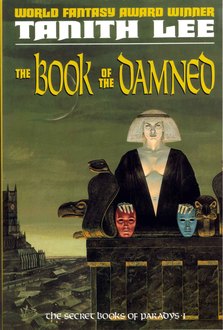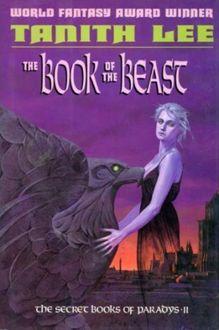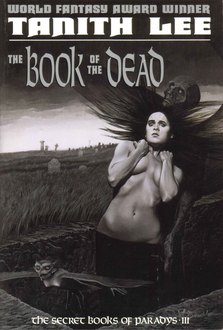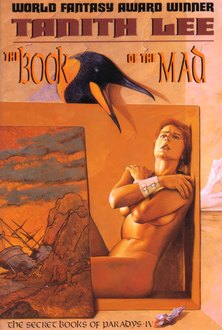The Novels of Tanith Lee: The Secret Books of Paradys
 |
 |
 |
 |
We’re continuing with our look at the extraordinary 40-year career of Tanith Lee, who passed away on May 24th. We started with The Wars of Vis trilogy and her acclaimed Tales From the Flat Earth, and today we turn to her four-volume saga, The Secret Books of Paradys, published in the US by The Overlook Press between 1990-1993, with a striking series of covers by Wayne Barlowe (above).
Matthew David Surridge wrote a fine summary of the entire series for us two years ago, and I doubt I could do a better job of summarizing them than he did:
The fictive city of Paradys itself seems to accrue layers of meaning and complexity like a recurring landscape in a lucid dream. Above all, the books are weird with the weirdness of nightmare; though written with incredible technical skill, it’s difficult to articulate a single overall theme to the books, though multiple meanings suggest themselves.
Paradys is a city in northern France, originally a Roman settlement based around the exoploitation of soon-played-out silver mines. It developed over time into a major city, with a cathedral and taverns and damned poets and all the appurtenances of decadent gothic romance. The various stories of Paradys take place in different eras of the city’s life, told from different perspectives, using different styles. They’re linked by certain patterns of imagery — notably the ambiguous symbol of the moon — and a concentration on colour: each book, or long story, has a certain colour which defines it, and all colour-references within that story will refer either to white, black, or that specific hue. I can only imagine how difficult that technique is, but it’s incredibly effective at building distinct and distinctive atmospheres…
What sort of horrors live in such a place? There are vampires and bad angels and evil magic, but these monsters aren’t conventional. They’re not explicable, not reducible to a label. And not always the focus of the stories; these aren’t plot-oriented tales at all. These tales are about character primarily, but not characters easily defined by diagrams or conscious wants. I think these are dream-characters fit for the dream-city, characters that have to come to terms with the irrational within themselves, with irrational wants and unreasoning desires.
This isn’t an easy series to track down. Unlike the Tanith Lee novels we’ve covered previously, The Secret Books of Paradys never had a mass market paperback release, which means it’s only available in limited edition hardcovers, and the Overlook trade paperback editions — all of which have been out of print for roughly two decades.
The books are:
The Book of the Damned (1988) – a collection of three novellas
The Book of the Beast (1988)
The Book of the Dead (1991) – a collection of eight stories
The Book of the Mad (1993)
The last two books in the series also never had a UK edition of any kind, which is unusual. I was also surprised by the lack of a US paperback. I expected Lee’s longtime publisher DAW to eventually reprint them. But as Matthew points out, these are highly adult works, quite a bit different from her adventure fantasy material:
These are also highly sexualised stories. I don’t find that sex and horror are conflated — the horror does not, on the whole, reside in the sexual aspect — so much as the sexuality becomes one of the keys to the unknown, the repressed, even the forbidden. It also becomes part of the grotesque over-the-top aspect as needed. Lee manipulates the atmosphere of the stories expertly, so that they can be dully bleak and then wildly excessive and even both at once; the sexuality of her characters, their understandings and fears and occasional startling lack of empathy, is very much a part of that.
But if sex in itself is not a thing to be feared in these stories, it is involved in the brutality that runs through them. These tales are genuinely dark, except, perhaps, insofar as they consciously venture into irony, if not self-parody. But irony itself comes to seem a limited, defensive stance. Terrible things happen to people in Paradys for no reason, and at length. You might expect as much from horror stories. But Lee doesn’t just fill these pages with bad things happening; she depicts characters reacting to these happenings in awful ways. Usually, it’s their lack of reaction, that lack of empathy I mentioned, that is most terrible. That lack implies something about their limits, about what they may have lost as a result of what they’ve gone through. They become, many of them, monsters: monsters of egotism. Like sleepers, dreaming, locked in their own skulls.
See Matthew’s complete article here.
We’ve covered the following Tanith Lee books so far:
The Novels of Tanith Lee: The Wars of Vis by John O’Neill
The Novels of Tanith Lee: Tales From the Flat Earth by John O’Neill
The Novels of Tanith Lee: The Secret Books of Paradys by John O’Neill
The Novels of Tanith Lee: Days of Grass by John O’Neill
The Collections of Tanith Lee by John O’Neill
Tanith Lee’s Secret Books of Paradys by Matthew David Surridge
Return to The Flat Earth: Reviving a Masterpiece by John R. Fultz
Tanith Lee’s Lionwolf Trilogy by John R. Fultz
See all of our recent posts on Series Fantasy here.
The omnibus is very easy to find. I see it every time I’m at Waterstones.
LOVE-LOVE-LOVE these books! This is a phenomenal series that defies the tropes of traditional fantasy by looking at a fantastical or alternate-history version of Paris. Each book is set in a different time period and is pure Tanith Lee greatness. ‘Nuff said.
A succinct mini-review, John… I should have farmed this one out to you! 🙂
There’s actually an Overlook Press omnibus edition:
http://www.amazon.com/Secret-Books-Paradys-Tanith-Lee/dp/1585679879/ref=sr_1_1?ie=UTF8&qid=1434680852&sr=8-1&keywords=tanith+lee+paradys
(and I’m currently kicking myself that I didn’t grab the Kindle version a few months back; it’s currently unavailable).
The SFBC also put out the series in two omnibus volumes, two books per volume — plenty of reasonably-priced used copies on Amazon, it appears.
Yes, this really is a great series.
I picked up the first 2 British volumes 2 decades ago. Just before I got around to reading them I discovered there were two further volumes. Never found the British versions and now I know why. Finally found the Overlook ones, yet I still dither about reading them.
As I recall, from my on and off searching there were two “readers bookclub” hardbacks printed years back. Binding book 1&2 and then 3&4 into two omnibus editions.
Robert, Joe,
I wasn’t aware there was a single-volume omnibus of the whole series… if I had been, I definitely would have mentioned it in the article. Thanks!
> As I recall, from my on and off searching there were two “readers bookclub” hardbacks printed years back.
Tiberius,
Yeah, those are the Science Fiction Book Club editions. Matthew has the covers in his article.
More wonderful books that I need to read. I wonder if they have a pattern similar to the Flat Earth books, that is, if the compilation volumes are easier to read than the “complete novel” volumes? Ms. Lee seemed to excel at shorter lengths.
I’d like to write about Lee’s standalone A Heroine of the World, an underrated and sometimes downright maligned book that I enjoyed and admired a great deal. I should admit it’s the only Tanith Lee I’ve ever read, because I’d picked up on the chilling-lack-of-empathy in some of her other works and found it off-putting. Heroine has an underlying compassion and a sense of humor, though those aren’t the book’s most notable characteristics. Maybe after the de Castell review?
> I’d like to write about Lee’s standalone A Heroine of the World, an underrated and sometimes downright maligned book…
> Maybe after the de Castell review?
You know, I’m not sure I’ve even SEEN that book. And yes, I’d love to hear what you think of it in more detail.
I’d also love to see what Sarah has to say about Heroine. I admit I bounced right off of it the first couple of times I picked it up, but the third(?) time was the charm, and I was really glad I persisted with it.
(PRO TIP: If all you take on a vacation is the book (or books) you’re having trouble with, then you won’t be able to put them down in favor of something easier.)